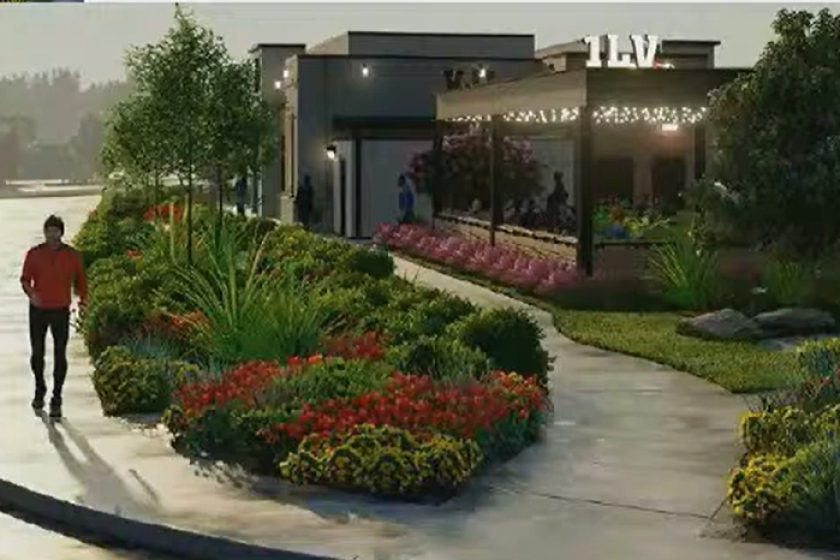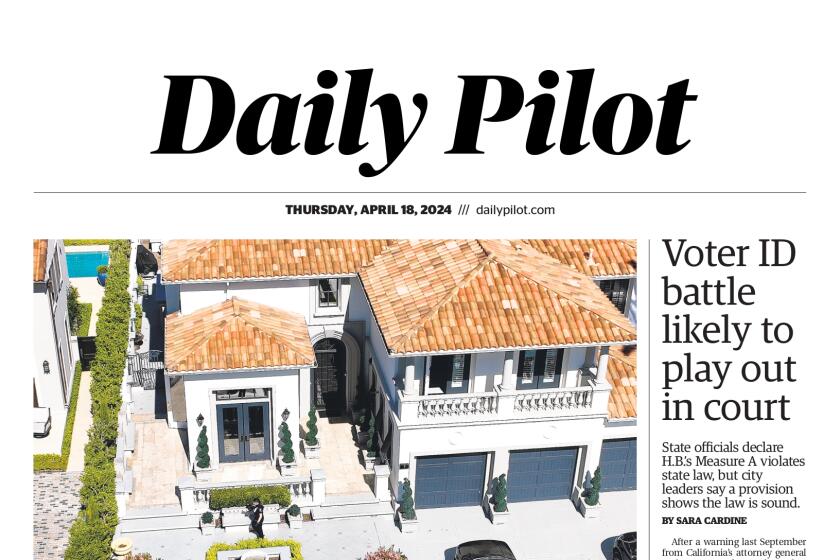Task force proposes parking solutions
The Huntington Beach Downtown Task Force offered a three-pronged approach Feb.13 to parking problems in the area.
Residents have often complained that downtown visitors and some employees tend to park in the neighborhood rather than in the parking structure, and often create noise and other disturbances.
As a response, the committee recommended to the City Council three fixes that could potentially corral visitors into the 830-lot Main Promenade parking structure, between Walnut and Olive Avenue off Third Street.
Task force members said the council should look into residential permits, extension of the parking-meter enforcement time — from midnight to 2 a.m. — and the feasibility of designating parking spaces on the top level of the parking structure for downtown employees only.
City beach parking and camping supervisor Dottie Hughes told the committee that the structure is generally at capacity during the summer and large events, but usually does not fill up during regular weekend nights.
The city charges a flat rate of $5 after 9 p.m. to park in the structure, and task force member Ron Newman said he is surprised that people were not taking advantage of the low fee.
“The $5 fee for parking in the evening is such a reasonable fee,” he said. “I can’t believe it doesn’t fill up.”
The Main Promenade parking structure catered to about 630,000 vehicles during the city’s 2012-2013 fiscal year, with about 225,000 customers paying the regular rate, typically $15 maximum for the day, Hughes said. The other users had an annual parking pass, used validated parking or left within the 30-minute grace period.
However, only about 16,000 visitors used the structure after 9 p.m. on the weekends last year.
Downtown residents have for years thought about the benefits of permit parking and some are beginning to push the city for it.
Councilwoman Connie Boardman said a mechanism for such a change is already in place, but it would be somewhat of a complicated procedure for downtown.
The difficulty lies with the streets in the coastal zone, where the California Coastal Commission oversees activities.
If a street is located outside the agency’s jurisdiction, 67% or more of the residents on the street need to agree, by way of a survey, to permit parking. Once that is achieved, it is just a matter of the city placing new signs on the street and handing out placards to residents.
If the street is located within the coastal zone, residents would still need to collect signatures, but the city would have to go through extra, sometimes lengthy, steps to establish residential parking.
If a street is in the non-appealable portion of the coastal zone, the city would need to create a coastal development plan, Director of Planning and Building Scott Hess said. However, if a street is within an appealable area, such a plan would still be needed, but anyone, including the Coastal Commission, could contest the action.
Hess added that the Downtown Specific Plan would need to be amended if the residential street is part of the downtown area.
Task force members also looked into extending the enforcement hours of residential parking meters, from midnight to 2 a.m., to get more people into the structure.
“I think if they know their meter’s up at 2 [a.m.], they might hustle to their car instead of loitering, singing and having a grand old time,” Lt. Kelly Rodriguez said.
Currently, motorists parked at an expired meter will be slapped with a $48 fine, police Chief Robert Handy said.
He added that hours for the parking enforcement staff, which also end at midnight, would need to be extended as well.
Residents haven’t solely complained about the rowdy, often intoxicated, bar patrons who stroll back to their cars in the middle of the night. They have also voiced displeasure with downtown employees talking loudly after hours.
To get those workers to park in the structure, task force members thought designating parking on the top floor would be a solution.
According to parking records, more than 100 employees bought the $20 monthly employee pass from October to January. Among the largest purchasers were Fred’s Mexican Cafe, which bought 55 passes, and Sharkeez, which bought 54 passes for its employees.
“They don’t have to search for a parking spot,” Councilman Jim Katapodis said. “They know they could go right to top and have parking.”
*
Downtown Task Force resignation
In other task force news, task force member Kim Kramer resigned from the committee for personal reasons.
Kramer was one of five members who represented the residents in the area. He also serves as the president of the Huntington Beach Downtown Residents Assn.
He was the most outspoken member on the committee, where friction was often created.
“The HBDRA Board of Directors believes there are many opportunities available to improve public safety and residential quality of life in the downtown district,” he wrote in his resignation letter. “We intend to move forward as quickly as possible to do this in a manner that best serves the interests of both the downtown residential and business communities.”
All the latest on Orange County from Orange County.
Get our free TimesOC newsletter.
You may occasionally receive promotional content from the Daily Pilot.



